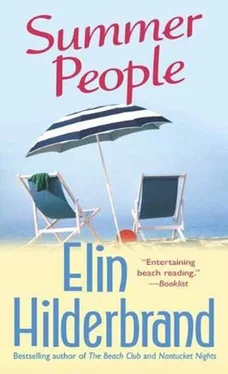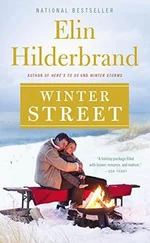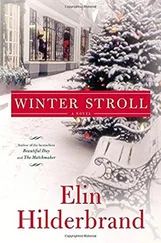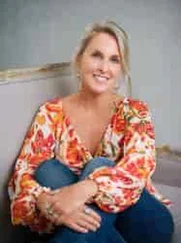The house was so new that there was no front door, only an extra-wide arched opening. The floors were plywood, but all of the drywall was hung, and a boy of about eighteen knelt in the hall sticking a screwdriver into an outlet, which seemed to Beth a perilous undertaking. When the boy saw her, he stared for a second-clearly there weren’t many women on these work sites- and Beth was able to ask for David.
“They’re painting on the third floor,” the boy said, finally blinking. Beth wondered if something was wrong with the way she looked-she’d taken extreme care in appearing casual. Khaki shorts, white T-shirt, flip-flops, her hair in a clip. Beth thanked the boy and proceeded up the stairs, two flights, to the third floor, which was comprised of a long hallway with many doors- bedrooms, bathrooms, a big closet. Beth found each one being painted a tasteful color-buttercream, pearl gray, periwinkle- but she did not see David. The kids painting were all teenagers, too. Beth asked one of them if he knew where David was.
“On the deck at the end of the hall, drinking his java,” the young man said. This kid was very pale and had black hair to his shoulders. “You his wife?”
Beth walked away without answering.
At the end of the hall were French doors, one of which was propped open with a gallon can of primer. The doors led to a huge deck that overlooked Maxcy’s Pond, which through the fog, had a dull silver glint, like a pewter plate. David sat in a teak chair, drinking his coffee, reading the newspaper. Beth watched him for a second, his right ankle was propped on his left knee and the paper rested on his legs. His sipped his coffee, turned the page, whistled a few bars from the music inside. Beth realized how enraged she was. At him, at Rosie-God, Rosie- and at herself.
“This is quite a view,” she said.
He swung around so quickly he spilled his coffee. When he stood up, the paper slid off his lap onto the deck.
“Beth,” he said. “What are you doing here?”
“I had a sneaking suspicion you didn’t actually work,” Beth said. “And I see now that I was correct.”
David wiped the coffee off his arm with a napkin, then he folded the paper up, but seemed at a loss for what to do with it, so he tucked it between the rails of the deck. It slipped through the rails and fluttered to the ground, three stories below. Beth took the chair next to his.
David gazed glumly at the newspaper below. “I’ve been here since five-thirty getting my guys set up,” he said. “I was taking my coffee break.”
“Not a bad life,” Beth said.
“Why are you here?” David asked. “You certainly didn’t come to praise my choice of career.”
“You know why I came.”
He looked at her in that old, intense way that made the bottom of Beth’s stomach swoop out. “I had nothing to do with it,” David said. “Rosie told them.”
“Oh, I know,” Beth said. “That only makes it worse.”
“She’s been wanting to tell the girls for years,” David said. “She was just waiting for the opportunity to present itself.” David sank into his seat. “Finding out that Piper was dating your son was irresistible.”
“It’s none of her business,” Beth said in a tight voice. She felt herself losing control and she reached for her mental reins. She breathed in through her nose; her ears were ringing with the injustice of it. Rosie kept the secret for twenty-five years only to let it splash at the worst possible time. “It’s nobody’s business but ours. Yours and mine.”
“We were married, Beth.” David looked at her, as if for confirmation, and she nodded. “It’s a part of your past you have to face.”
“But that’s what I mean,” Beth said. “Why shouldn’t I be able to face it when I want, or not at all? It belongs to me. But no one else thinks that way. You don’t believe I have a right to my own past, and neither do my kids. So I was forced to tell them the story about you and me and that summer, the cottage, the blood tests, the cosmos, the judge. I told them everything. Okay? I hope you’re happy.”
David was quiet for a moment. “How did you explain the part where you left me?”
“I explained it like it happened.”
“And how, exactly, did it happen?” David asked. He raised his palms and showed them to her, then he placed them on the sides of her face. She pulled back-this was already too much contact-but his hands held her steady. In her mind, she saw a struggle, she sailed over the deck’s railing to the ground where the newspaper lay in the mud.
“Let go of me,” she said, as calmly as she could.
“I loved you,” he said. “And you left me.”
“Yes,” she said.
He dropped his hands from her face and stuffed them into the pockets of his gray canvas shorts. Beth gazed at his tan legs fleeced with golden hairs, his crooked toes. His person was so familiar to her and yet he had changed. They were both different people now from the characters in the story she had told the twins. She noticed for the first time some gray hairs around his ears.
“I’ve thought about it so much this summer,” David said. “I haven’t seen you in what-three weeks? four?-and yet I’ve thought about you every day. I thought about kissing you.”
“David.”
“I thought about making love to you.”
“David!”
“And I asked myself over and over, What do you really want from this woman? She just lost her husband. What do you really expect?” He grabbed onto the rail and leaned forward as though he were the one contemplating a headlong dive. “Do you know what I decided?”
“What?”
“I want to know why you left me.”
Beth bounced on her toes. She felt the bike path calling her. She didn’t want to explain herself; she wanted to run away, just as she had twenty-five years ago.
“There were a lot of reasons,” Beth said. “Mostly, I wanted to finish college.”
“You could have finished on the Cape.”
“I wanted to finish at Sarah Lawrence.”
“You have no idea how snotty you sound,” he said.
“Maybe that is snotty, or maybe I just like to finish what I start.”
“Except in the case of our marriage,” David said.
Beth stared at the pond, which was a shade darker now. It was going to rain. “I couldn’t stand to disappoint my parents.”
“Now we’re getting somewhere.”
“I wanted to live my life the right way, David. Graduate, get a job, get married in a church with my parents’ blessing.”
“You were a coward,” David said. “You weren’t brave enough to follow your heart. When you actually agreed to marry me, I thought I had changed you into the kind of person who took risks. But when you left I saw that you were the same scared little girl you were at sixteen. Afraid of doing anything wrong, afraid of being your own person.”
He was trying to hurt her and she couldn’t blame him. At the time, Beth felt she had a choice between pleasing her parents and pleasing David, and, in the end, she chose her parents. But deep down, Beth also knew she was doing what was right. Thinking about that lunch at the Mad Hatter made her cringe inside, even now. She wouldn’t have lasted eighteen years as David’s wife. She would have taken off long before Rosie had. This, however, wasn’t a sentiment that ever needed to be spoken out loud, even if David was prodding her to admit it.
“I acted as my own person,” she declared. “I left of my own free will, because I knew it would be better for both of us.”
“Well, it wasn’t better for me.”
Beth stood up. “What is it you want me to say? That I’m sorry? Of course I’m sorry! Of course I remember what happened. When I was telling the story to the kids, I remembered every single detail down to what Danny and Scott were eating for breakfast the morning I went back home.” She glanced at David and was dismayed to see that there were tears in his eyes. Why was he ripping the scab off this old wound? Leave it alone! she pleaded silently. We’re old now. We have gray hair . “I was wrong for the way I left you. I was wrong not to tell you to your face, but I simply couldn’t. I was afraid. I knew I was going to hurt you and I didn’t have the courage to sit and watch. I loved you, David, in that blind way that teenagers love each other. But I was smart enough to realize that it wasn’t love for the long haul. When I left, I did us both a favor. That doesn’t make it right. I’m sorry. Even now, I’m sorry.”
Читать дальше












